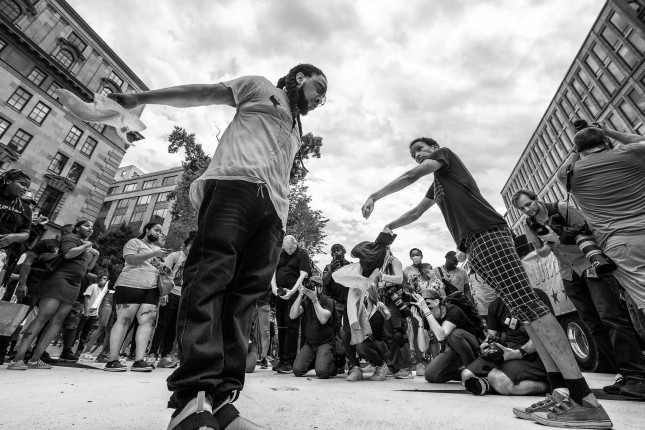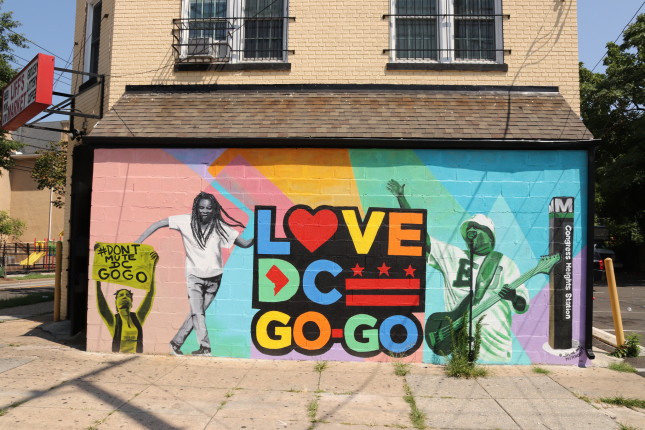-
#DontMuteDC: Go-Go and Social Justice in the District of Columbia
April 8, 2022 By Blair A. Ruble
In April 2022, as Washington awoke from its COVID slumber, The Kennedy Center turned to long-time community activist Ron Moten to organize a tribute to the city’s endemic sound, Go-Go. Moten has fought numerous battles against gentrification, displacement, and for social justice. He learned over the years that the loss of distinctive cultures stands at the heart of the dislocations occurring in cities across the nation. This embrace led to the establishment three years ago of a particularly potent urban social action group, #DontMuteDC. That movement’s story offers several important lessons about the power of the arts to mobilize support for social change.
Hometown Washington, during the 1960s and 1970s, was the center of racial resistance to a white-dominated status quo. Ranging from social protest and civil unrest through economic empowerment and political activism, race dominated every aspect of Washington life in a city that had gained a Black majority. D.C. proudly became “Chocolate City” as residents embraced their identity. The strength of connections between identity and cultural expression that took shape during these years helps to explain the powerful backlash against gentrification and displacement to follow.
During the late 1960s, local musician Chuck Brown created an infectious musical style combining a distinctive Latin-tinged beat with a call-and-response vocal track that came to be known as Go-Go. The music emerged on Washington’s streets and in its rough and tumble nightclubs. Go-Go quickly became the anthem of D.C.’s African American working class, pounded out on plastic pails by kids at subway stations, appropriated by homegrown bands such as the Junk Yard Band coming out of the Barry Farms projects, promoted by popular groups such as Rare Essence, How Cold Sweat, Backyard Band, and Shug-Go.
Alarmed at the disorder and crime sometimes associated with Go-Go venues, the city’s police carefully tracked performances, working with various licensing authorities to shut down clubs following violent incidences. The construction of a new baseball stadium for the Washington Nationals led to the demolition of several popular venues. Residents of newly gentrifying neighborhoods used local neighborhood advisory boards to shut down several more Go-Go haunts. These attacks maddened the city’s Black residents for whom Go-Go music and the culture surrounding it were essential elements of their identity.
In spring 2019, complaints largely from white newcomers to traditional African American neighborhoods led to a powerful backlash against attempts to control the music. The Metro PCS shop at the corner of Seventh and U Streets NW had blasted Go-Go music out onto the street for years. A newly arriving white resident at a nearby upscale condominium building complained to the president of the company owning Metro PCS to get the music turned off. That complaint prompted a petition signed by over 80,000 signatories demanding that the music continue to play. The communications company president relented, allowing the store to turn the music back on. This social media petition campaign simultaneously launched the #DontMuteDC movement.

Community and music activists used the energy created by the petition drive to mobilize D.C. residents in opposition to gentrification. Within a few weeks, tens of thousands of Go-Go fans gathered at the intersection of 14th and U Streets NW (the center of the city’s historical African American community and the starting point for the 1968 community uprising following the assassination of Dr. Martin Luther King, Jr.). Musicians and DJs performed on large sound trucks which served as their stage. Within months, the D.C. Council passed legislation designating Go-Go music the city’s official music.
These demonstrations prompted the formation of a new community movement. Named after D.C. slang for “homeboy/girl”—“Moe”—and the California music festival Coachella, the Moechella movement used their sound trucks to organize Go-Go concerts around town. During the Summer 2020 protests over the murder of George Floyd, Mochella trucks led demonstrators snaking their way around downtown D.C. starting at 14th and U Streets NW and ending at the newly created Black Lives Plaza a mile-and-half away. Mochella’s Go-Go protestors shut down tony Connecticut Avenue as they danced an evening away in front of the fashionable condominium building where President Trump’s Postmaster General Louis DeJoy resided to protest his plans to delay postal deliveries during that year’s Presidential elections.
Three years later, #DontMuteDC is going strong having stormed the ramparts of an institution such as The Kennedy Center. As the Go-Go movement demonstrates, music can serve as a powerful mobilizing force for society’s disaffected. Reaffirming a sense of shared identity, musical performances provide a means for striking back at those with higher social status and economic power by moving out of the theater and into the streets. Its lessons speak to all who are concerned with organizing on behalf of social and environmental justice.
Blair A. Ruble is a Distinguished Fellow at the Wilson Center, where he previously held several positions including Vice President for Programs. He is the author of seven monographs and co-editor of more than a dozen volumes examining the importance of cities for our future. His most recent monograph, The Muse of Urban Delirium, appeared in 2017.
Lede Image Credit: Go-Go dancers at a Juneteenth celebration at the Black Lives Matter Plaza in Washington, DC, courtesy of Flickr user Miki Jourdan.
Second Image Credit: Public mural in DC, featuring Go-Go artists and #DontMuteDC activist, courtesy of Flickr user Elvert Barnes.
 A Publication of the Stimson Center.
A Publication of the Stimson Center.




